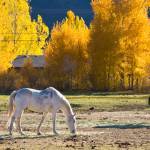Protein Supplements for Horses Grazing Poor Pastures

Most classes of horse will need a protein supplement at any time when poor-quality, low-protein forage is the only grazing available, such as when pastures are overgrazed or during a drought. The most important groups are pregnant and lactating mares, young growing horses, and old horses. Good-quality protein is vital for healthy development and growth of the fetus and young horse. Signs of a protein deficiency are muscle wasting and a potbelly, especially in young horses.
Full-fat soy contains nearly 38% protein and soybeans contain 40-48% protein. Soybeans provide almost all of the essential amino acids, including lysine, in sufficient amounts. Extruded full-fat soybean meal is popular for feeding young growing horses, providing “cool” energy in the form of fat as well as good-quality protein. Canola meal can be used to replace soybean meal as a protein and fat supplement.
Lupins, beans, and peas all have similar protein levels and a moderate lysine content, but beans and peas are less palatable than lupins and may be sorted out of the feed by finicky eaters. They all must be cracked before feeding to enable maximum digestion. Lupins can be fed at up to 2 kg (4.4 lb)/day, and more when other protein sources are limited. Some types of peas are toxic to horses.
Although sunflower seeds are deficient in lysine, an essential amino acid, they contain some fat, which adds energy to the diet. If the feed is low in protein, up to 500 g (1 lb)/day of sunflower seeds may be fed.
Cottonseed meal can be fed when grazing is poor, but not to young or breeding horses because of its low lysine content. Linseed meal is another protein supplement that has a poor lysine content and is often very expensive as well.








